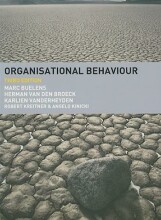Foundations of Organisational Behaviour - Sources of Inspiration of organisation and organisational behaviour theories
15 important questions on Foundations of Organisational Behaviour - Sources of Inspiration of organisation and organisational behaviour theories
Why do we need to know the historial evolution of OB?
Which are the sociologs which studied the implications of the shift from an agricultural-based economy to an industrial one and from feudalism to capitalism?
What did Durkheim study?
- Higher grades + faster learning
- Never study anything twice
- 100% sure, 100% understanding
What did Weber study in premiere?
When was the notion of scientifical management born?
What is scientifical management?
Who are the representatives of the rational-system view of the organisations?
Who was the founding father of scientifical management?
How did Taylor make the work of labour men more efficient?
What did he do after eliminating subtasks and timing the fastest performance?
In Taylor's view, what was the motivation for which the workers did not perform to their potential?
What did applying Taylor's theories resulted in?
Which is one of the most successful examples of a factory that successfully applied Taylor's principles?
How did they reach the low cost of the cars (making them available to the masses)
Do car manufacturers still make use of the scientifical management approach suggested by Taylor?
The question on the page originate from the summary of the following study material:
- A unique study and practice tool
- Never study anything twice again
- Get the grades you hope for
- 100% sure, 100% understanding































